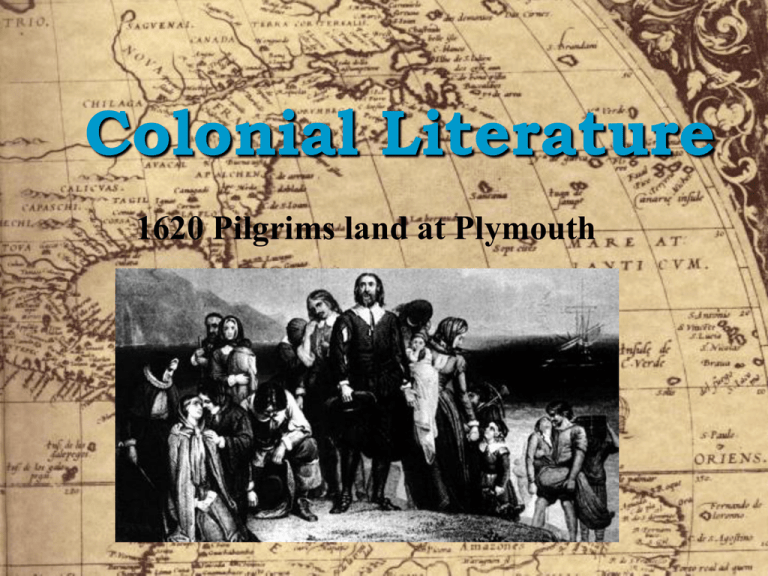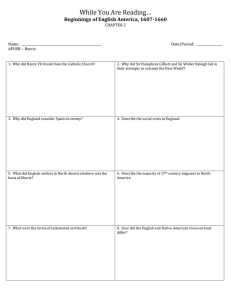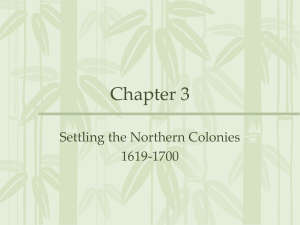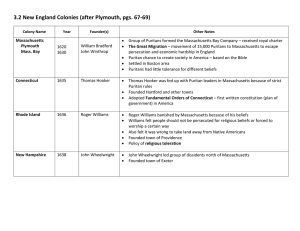Colonialism
advertisement

Colonial Literature 1620 Pilgrims land at Plymouth European Renaissance (1300-1600) Jamestown 1607 Major influences of the Renaissance Expansion of trade and growth of the middle class Agrarian revolution, decay of unions, development of the capitalist system Creation of modern nation-states Birth and development of the individual Geographic discoveries Characterized by: The rebirth of learning Development of the concept of the free individual Throwing off of traditional restraints of medieval learning and authority Motives for English coming to the New World The assertion of British national pride and honor against the Spanish, French, and Dutch Economic Considerations – Colonialism was a way to relieve England of some social problems Propaganda about the New World as a glorious place – Free land, free from social ills Desire to start an ideal Christian society – “Zion on the Hill” Colonial America 1607-1763 Before a distinctive American Literature could be written, three conditions had to be met: Colonist had to be free from their survival needs to have time to think and write They had to develop a sense of themselves as Americans They had to develop a way to publish and distribute American writing to American readers Early American Literature was UTILITARIAN – Stressing practical usefulness rather than style or beauty Earlier colonial writing took the form of : Narratives Descriptions Observations Reports John Smith Journals and histories Later colonial writing the emphasis shifts to: Sermons Poetry Puritan minister breaks up farm house frolic The Puritans Basic tenets of 17th century Puritanism God’ absolute authority and sovereignty – The scriptures as the basis of truth and the guide to life Predestination – The belief that through God’s decree certain people are destined to be saved The universal sinfulness of man The election and salvation of some by God’s grace Characteristics of Puritan Literature Strenuous and serious Attempts to represent life truly Every event represents a double reality – The event as a natural occurrence – The event as a significant message from God Puritan Influences on American Thought and Culture Emphasis on hard work A belief in democracy The drive toward affluence Emphasis on the value of education and science A preoccupation with guilt The notion of progress Early Writing in New England More that the southern colonies, the circumstances in early New England favored literary development. The Puritans had a determined and disciplined way of life. Characteristics of the Puritan group who settled Plymouth Plantation and the Massachusetts Bay Colony area: More compact settlements High degree of industry Disciplined enterprise A community conscious of experience and purpose Determined to make America their home Firsts in America Facilities for literature were first provided in Massachusetts – First college, Harvard, 1636 – First printing press, Cambridge, 1638’ – First commercial press, Boston, 1674 – First successful newspaper, The Boston News--Letter, 1704 Harvard College The Planters and the Puritans Two contrasting value systems John Winthrop William Byrd Planters Region: Virginia Founded: Jamestown,1607 Literary Figures: John Smith, William Byrd Early Government: control by landed aristocracy Motive: money and social position Culture shaped by tobacco and by the plantation way of life Puritans Region: Massachusetts Founded: Plymouth, 1620 Literary Figures: William Bradford, Cotton Mather, Anne Bradstreet, Edward Taylor, Jonathan Edwards Early Government: Theocracy Motive: religious freedom Culture shaped by religion Cultural Characteristics: Planters – a desire to continue the English traditions of landed aristocracy – Based on slavery – Economic inequality – Conspicuous consumption – Scattered population with few towns – Assumption that life was to be enjoyed (dancing, horseback riding, gambling, drinking,music) – Division into upper and lower classes Cultural Characteristics: Puritans – A cluster of small towns – Much interchange of ideas – Rough economic equality – Emphasis on education and hard work – Economy based on small trades and crafts, sea industry, and farming – Development of the town-meeting system – Development of a majority of middle class Whipping a Quaker in Boston





